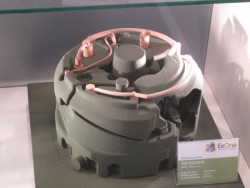The ExOne S-Max has held its place as the world’s largest sand-casting additive manufacturing system since its introduction in 2010.
Designed to be used in a foundries or industrial design facilities, the S-Max can use CAD files to create complex sand cores and molds for casting.
With a number of different sand materials at its disposal the S-Max can produced castable molds that will work with a wide range of metals. That flexibility allows the system to fit a range of applications from traditional to advanced manufacturing.
How the ExOne S-Max Works:
The S-Max uses an additive manufacturing method called Binder Jetting to build its models. In the binder jetting process a print head selectively deposits a liquid binding agent onto a layer of sand particulate, similar to the way an inkjet printer prints a page. Once a layer of binder has been deposited a carefully measured layer of sand is brushed across the build chamber and the process begins anew.
What sets the binder jetting technique apart from other AM methods is its lack of welding, melting or heating. Because the S-Max lacks does not use these processes its parts don’t suffer from the residual stresses that can be a byproduct of rapid heating and cooling. The fidelity of the binder jetting process allows for extremely large sand casts to be produced, including room sized architectural forms or engineering pieces with unprecedented complexity.
Once the S-Max has completed a print, a technician can remove the part from its surrounding encasement of sand, vacuum or blow-off the part and then proceed to casting. Little to no post-processing is required.
The ExOne S-Max in Action:
For over 80 years Standard Alloys has been in the business of making high-quality castings and machined parts. When a customer approached them with the idea of casting a 57-inch impeller in short order, Standard knew they needed a new solution to meet their lead time requirements.
The team at Standard were able to design and print the largest rapid casting core they had every created within 8 weeks. In fact, ExOne’s machines were capable of building the entire impeller’s core, complete with hydraulic balancing, in a single week.
Read more at ENGINEERING.com


